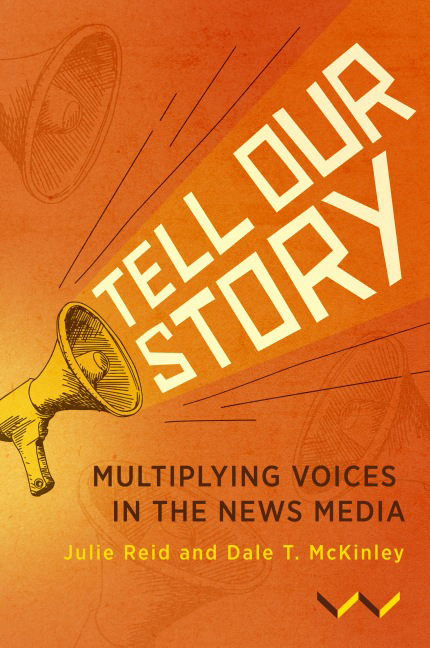Book contents
- Frontmatter
- Contents
- List of Figures
- Acknowledgements
- Abbreviations and Acronyms
- Chapter 1 The Importance of Voice and the Myth of the ‘Voiceless’
- PART 1 FROM THE INSIDE: VOICE(S) FROM THE GROUND
- Chapter 2 Community Perspective, Experience and Voice
- Chapter 3 Glebelands Hostel, Durban
- Chapter 4 Xolobeni, Eastern Cape
- Chapter 5 Thembelihle Community, Johannesburg
- PART 2 FROM THE OUTSIDE: DOMINANT VOICE
- Chapter 6 Dominant Media Telling and Elite Communication
- Chapter 7 The Political Economy of Dominant Power and Storytelling
- PART 3 NEW TRAJECTORIES FOR JOURNALISM AND VOICE(S)
- Chapter 8 Media Diversity and Voice(s)
- Chapter 9 Rethinking Media Freedom, Revamping Media Ethics
- Chapter 10 Planting the Seeds of Change
- Notes
- Bibliography
- Index
Chapter 6 - Dominant Media Telling and Elite Communication
Published online by Cambridge University Press: 10 September 2020
- Frontmatter
- Contents
- List of Figures
- Acknowledgements
- Abbreviations and Acronyms
- Chapter 1 The Importance of Voice and the Myth of the ‘Voiceless’
- PART 1 FROM THE INSIDE: VOICE(S) FROM THE GROUND
- Chapter 2 Community Perspective, Experience and Voice
- Chapter 3 Glebelands Hostel, Durban
- Chapter 4 Xolobeni, Eastern Cape
- Chapter 5 Thembelihle Community, Johannesburg
- PART 2 FROM THE OUTSIDE: DOMINANT VOICE
- Chapter 6 Dominant Media Telling and Elite Communication
- Chapter 7 The Political Economy of Dominant Power and Storytelling
- PART 3 NEW TRAJECTORIES FOR JOURNALISM AND VOICE(S)
- Chapter 8 Media Diversity and Voice(s)
- Chapter 9 Rethinking Media Freedom, Revamping Media Ethics
- Chapter 10 Planting the Seeds of Change
- Notes
- Bibliography
- Index
Summary
The media does not care about us, they never report things relevant to us and papers are only interested if there is bad news about us … there's nothing in the papers that talks to us and about our struggle and lives. It's like we don't exist.
— Blikkiesdorp residentThese words ring loudly for poor people and the communities they live in across the width and breadth of South Africa. While they might not apply to all media, they apply to the dominant media in general. As captured in chapter 1, the dominant media is that collection of print and audio-visual media outfits (most often corporations), whether state or privately owned, that monopolise the framing of narrative within the media landscape.
In form, content and character, this dominant media is framed and moulded by a corporatised, neo-liberal market structure, which is a crucial component of South Africa's political economy. Since 1994, that structure has fuelled a commercial model of ‘media transformation’. In turn, ‘the political economy of South Africa's transformation has determined the political economy of the media – in the process setting limits, exerting pressures and closing off options for media transformation’ (Duncan 2009: 22). Like all similarly situated dominant sectors within South Africa's capitalist political economy, the dominant media’s ‘attitude of unwillingness to address a lack of diversity of content … excludes deep and thorough reporting on, and engaging with, grassroots peoples, communities and their experiences’ (Reid 2017b: 534).
There is little to no incentive – whether commercially, politically or programmatically – for the dominant media to either consistently and genuinely acknowledge or integrate the voices of the poor and marginalised precisely because they do not feature as substantive consumers in their profit-driven media market (Plaisance 2009). Rather, this media sees its main ‘societal purpose’ as being ‘to inculcate and defend the economic, social and political agenda of privileged groups that dominate … society and the state’ (Herman and Chomsky 1988).
Nowhere is this more applicable than in respect of the ways in which the dominant media, throughout the post-1994 democratic era, have told the stories of the majority of South Africa's population – the workers and poor. It is not that poor communities have no agency, no voice; indeed, that agency and voice is at the heart of popular and democratic struggle and contestation in contemporary South Africa.
- Type
- Chapter
- Information
- Tell Our StoryMultiplying Voices in the News Media, pp. 103 - 132Publisher: Wits University PressPrint publication year: 2020



